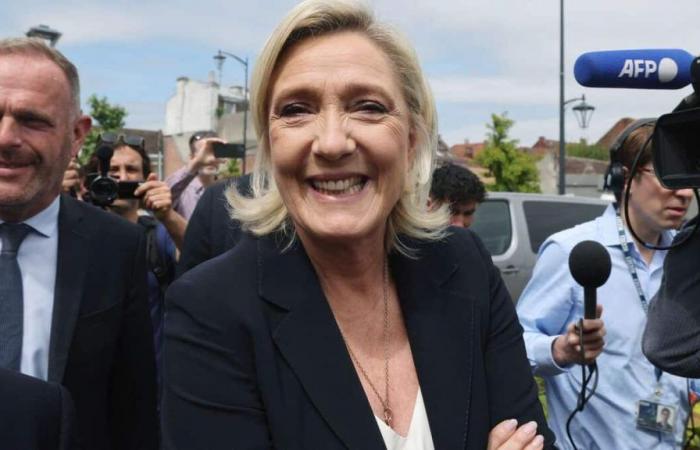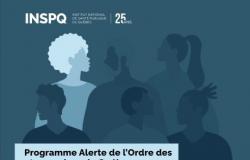
The National Rally came well ahead on Sunday, according to the first estimates of polling institutes, in the first round of historic legislative elections which could open the doors of power to the far right for the first time under the 5th Republic.
• Read also: Legislative elections in France: some keys to better understanding the results of the first round
• Read also: “I’m afraid for my country”: French residents in Quebec called to the polls
With 34.2-34.5% of the vote, the party of Jordan Bardella and Marine Le Pen and its allies are ahead of the New Popular Front bringing together the left, which obtains 28.5-29.1%, far ahead of the camp of Emmanuel Macron at 20.5-21.5%, during this vote marked by a sharp increase in participation, according to estimates published at 8 p.m. by Ipsos and Ifop. The Republicans who have not formed an alliance with the RN stand at 10%.
The first projections of seats for the future National Assembly, to be taken with great caution, envisage a strong relative majority for the RN and its allies, or even an absolute majority at the end of the second round next Sunday.
After the surprise dissolution of the National Assembly, announced by the Head of State on the evening of the defeat of his candidates in the European elections of June 9, the political landscape should be profoundly disrupted.
But in reality, there are 577 ballots to choose as many deputies, and the reconfiguration will depend on the dynamics between now and the second round, next Sunday, and on possible withdrawals and voting instructions in each constituency. Especially since the second round should be marked by a record number of potential three-way races.
“Large gathering”
“Faced with the National Rally, the time has come for a large, clearly Democratic and Republican gathering for the second round,” said Emmanuel Macron in a written statement sent to the media at 8 p.m. He welcomed the “high participation” which “testifies to the importance of this vote for all our compatriots and the desire to clarify the political situation”. “Their democratic choice obliges us,” he added, after bringing together the leaders of the parties with whom he has governed since 2017.
While the “Republican front” against the far right has continued to crack over the years, the President of the Republic has not completely clarified the attitude to follow in the event of duels between the RN and the NFP or triangular. Tenors of his camp seemed until now rather inclined towards a “neither RN, nor La France insoumise”, castigated by the left and criticized even in his own camp.
On the left, environmentalists, socialists and communists have announced that they will withdraw if another candidate is better placed to block the RN.
At LFI, Jean-Luc Mélenchon asks voters not to give votes to the Le Penists, but without talking about withdrawals. His party should clarify its position for the second round on Sunday evening.
With the best score in its history in the first round of voting, improving on the already record score in the European elections, the RN sees the unprecedented prospect of obtaining a relative or absolute majority on July 7.
Embodied by the smooth face of its young president Jordan Bardella, 28 years old, the Le Pen party hopes to transform the test in a week.
If Jordan Bardella were to enter Matignon, it would be the first time since the Second World War that a government from the extreme right would lead France. The president of the RN has however warned that he would only accept the post of prime minister if his party holds an absolute majority.
It would also be an unprecedented cohabitation between Emmanuel Macron, pro-European president, and a government much more hostile to the European Union, which could spark sparks over the prerogatives of the two heads of the executive, particularly in matters of diplomacy and defense.
Assembly blocked?
Another possible scenario is that of a blocked Assembly, with no possible alliance between very polarized camps, at the risk of plunging France into the unknown.
Despite differences that could seem irreconcilable, the left managed to unite in the wake of the dissolution. But the disagreements between LFI and its partners, in particular over the contested leadership of Jean-Luc Mélenchon, quickly resurfaced and often parasitized the campaign of this coalition in the form of a nod to the Popular Front led by Léon Blum in 1936.
During this time, nothing seemed to slow down the dynamics of the RN in the campaign on purchasing power and against immigration: neither the vagueness on the repeal of Emmanuel Macron’s pension reform, nor the controversies over the binationals, or the sulphurous remarks of certain far-right candidates.
At the end of this day which saw a large influx into the polling stations, participation should be at least 65% of those registered, according to polling institutes. That is to say well above the 47.51% in 2022, but below the 67.9% of the last legislative elections organized after a dissolution, in 1997.
Overseas, the outgoing deputies of the centrist Liot group or invested by the NFP are in the lead in Guadeloupe and Guyana. In Polynesia, the autonomist candidate Moerani Frébault is elected in the first round. First elected of the 577 new deputies, he will also be the first Marquesan to sit in the National Assembly.
In Martinique, the RN managed to qualify one of its candidates for the second round, a first in this department. But with less than 10%, he has very little chance of being elected next week.
In the polling stations, many voters expressed their excitement during the day for these early elections.
“I would like to find some peace, because since the European elections, everything has taken on a worrying scale. But we must continue to fight for what we believe in,” Roxane Lebrun, 40, told AFP in Bordeaux. In Saint-Étienne, Christophe, a 22-year-old police officer, was worried about a vote that risks “dividing the population even more.”
In the northern districts of Marseille, Nabil Agueni, 40, went to the polls even though he had not gone to the polls in the European elections: “As long as we have the choice, it’s better to go and vote,” he says. Theo, 30, a Rennes resident who works in culture, notes that, in his entourage, “a lot of people who don’t usually vote are going to vote.”
In Rennes as in Lyon, many shops in the city centre have protected their windows for fear of disturbances after the announcement of the results.





